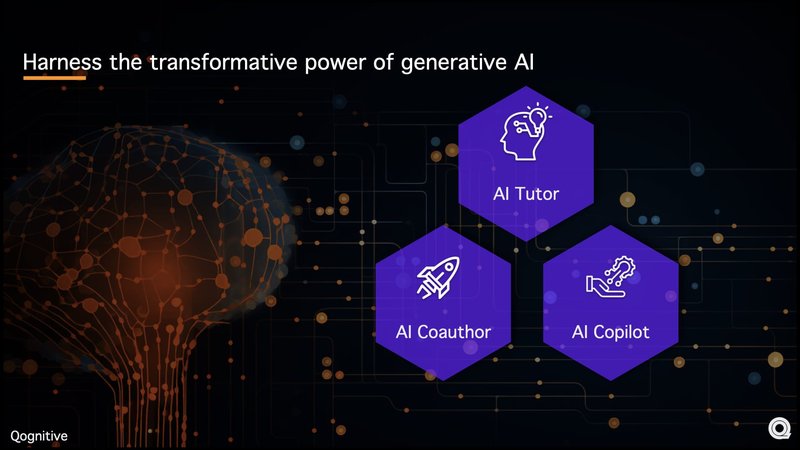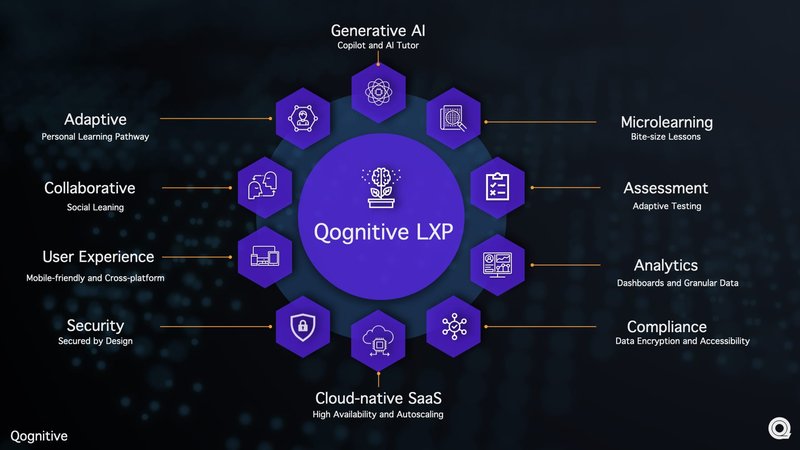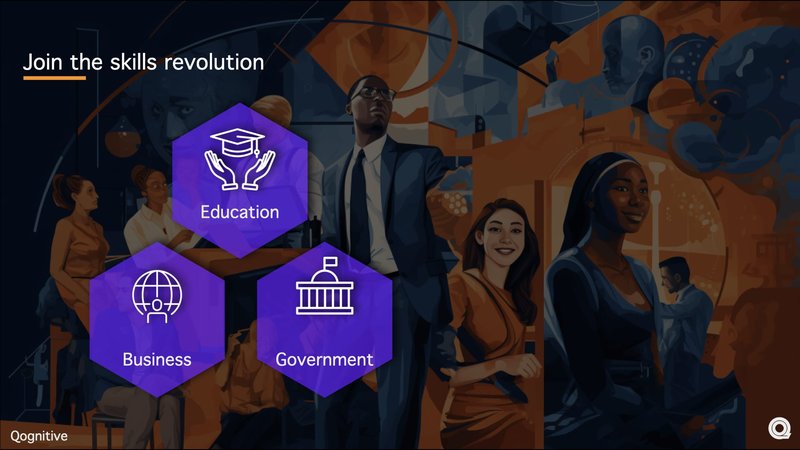Voice: AI-generated courtesy of Qognitive Lab
In a recent discussion, storytelling coach and podcast host Alex Searle engaged with Shawkat Ali, the entrepreneur and technologist heading ThamesCatalyst. This article delves into the vision behind Qognitive's forthcoming SaaS release, a modern learning platform and solutions accelerator.
Discover how Qognitive aspires to make AI accessible to the learning community, the evolution of AI-powered education and its goals within the EdTech landscape.

By its nature, disruption is an uneven and unpredictable process.
The technologies, forces and ideas which end up changing the world usually start out as fringe, sometimes unthinkable fantasies. Yet the loom, steam engine and iPhone are now so commonplace that we could easily (and often do) take them all for granted.
However, the story of disruption always takes on this familiar pattern, and in the case of AI, there’s no exception. As adoption becomes mainstream, Qognitive's mission is to support education, government, and business enterprises in implementing their own AI-powered learning platforms and modernising their learning and development workflows.
Shawkat Ali, the entrepreneur and technologist behind Qognitive, anticipates an AI-led revolution in learning and skills development. His objective for Qognitive, a SaaS-delivered learning experience platform, is to enable learning organisations to realise their vision and support them on their AI transformation journey.
‘Traditional learning and education models are due for a significant update,’ reflects Ali. ‘We’ve enjoyed so much positive disruption from finance to communications and social media over the last few decades, but it has yet to take place in the realm of learning and education.’
Incubated during the weary months of Covid, Ali leveraged this nascent technology stack to develop Qognitive’s first live use case, the Outnumber project.
As often happens with inventors, a newly discovered need drives fresh innovation.
While under lockdown, Ali’s two young children lacked decent digital alternatives to maintain their remote learning. In particular, he felt that their mathematics had suffered, and decided to implement the first edition of what would become the Outnumber project, an AI-enabled maths learning and tutoring application for primary school kids aged 4-11 years.
Four years later, inspired by the success of the Outnumber app, Ali has come full circle to launch Qognitive as a new, feature-rich learning experience platform in its own right.
‘Outnumber’s core learning features marked the debut of our AI tutor tailored for primary maths students. Their early user feedback was pivotal, significantly shaping Qognitive's developmental trajectory, and instilled the confidence necessary to revisit and refine our designs, which in turn led to the comprehensive development of Qognitive.’
Ahead of Qognitive’s first SaaS release in July 2024, Ali foresees Qognitive playing a key role in integrating AI in learning and development workflows across educational institutions, businesses and the public sector in the UK, as well as internationally.
This is the remarkable story of Qognitive: the ideation, development and launch of an unassuming, disruptive AI-enabled learning force the world didn’t know it needed.
Making AI-enabled learning accessible
Back in 2020, Shawkat Ali had already been experimenting with various AI models for the Outnumber project, in an effort to fast-track the development of an AI tutor teaching primary-level maths.
‘I had been long convinced that artificial intelligence would one day be the driving force behind the much-needed disruption of education. But even a few years ago we didn’t have the necessary tools to develop consumer-grade AI applications. I’m glad to see the industry is making such rapid progress.’
A driving theme behind Qognitive’s development has been making AI accessible to the learning community. It’s about embracing the best of both worlds of education: fusing the experience and talent of accomplished educators with AI-driven content and learning frameworks.
The ultimate goal of Qognitive is to provide organisations with the tools and technology to boldly experiment with AI through augmented learning workflows and accommodating customisation.
‘Right now, we're seeing an empowering trend where compact AI models are gaining in potency and accessibility, allowing individuals to use them on personal devices. Also, the rise of open-source models opens the door to designing new, innovative bespoke solutions more precisely aligned with the needs of clients.’
A standout feature of the platform is its AI copilot. It works as a conversational coauthor, which interacts with a user through a chat interface to generate text, audio and images from simple text prompts.
‘As a content creator, educator or administrator, the AI copilot/coauthor helps to simplify your workflow and get tasks done,’ notes Ali.
In Qognitive’s daily operations, the copilot feature is extensively used for software engineering tasks.
‘By creating 'AI workflows' using customised system prompts, you can efficiently tackle a variety of applications, including developing learning outcomes from curriculums, crafting lesson plans, generating problem sets and brainstorming project ideas.’
Despite the vast potential of artificial intelligence, its full capacity can be hindered by limited in-house resources and the struggle to keep up with a constantly evolving innovation. This is where Qognitive's Generative AI Lab plays a crucial role.

Collaboration & innovation: Generative AI Lab
Although AI’s general popularity has ballooned, it is still viewed as a 'black box': a complex system that confounds normal understanding. To that end, Qognitive is supported by a Generative AI Lab, which concentrates on demystifying this black box and bridging the gap between cutting-edge research and practical applications.
Also, Qognitive is integrated with leading AI model providers, including Open AI, Google Vertex AI, Mistral AI and others. The Lab continually researches new models and incorporates them into the platform, allowing users to experiment easily and safely, and choose the model that would best enhance their AI copilot or tutor.
‘We champion a vendor-neutral stance, ensuring access to a variety of top-notch AI models from leading providers. This allows for robust comparison and thorough validation before rollout in live settings.’
On the subject of AI sovereignty, the concept of model independence becomes a crucial point. This entails the ability to train and deploy one's own large-scale models.
‘For some clients, this represents the height of their ambition, ensuring data remains protected and workflows impervious to unpredictable adjustments from external model updates,’ adds Ali. ‘However, the reality is that the development of proprietary AI models often comes with a hefty price tag.’
Fortunately, the Lab is diligently researching and creating cost-effective solutions to realise the vision of fully autonomous AI. It's not solely the models, but also the features (many of which have been reimagined for the era of AI) that underscore the Lab's work as truly impactful.
When asked about Qognitive’s most impressive, standout feature, Ali does not hesitate.
‘It’s definitely our storyboarding feature, which offers a powerful way for users to deconstruct complex ideas and present them in a clear, engaging manner – all with the assistance of generative AI.’
Storyboards allow a creator's story to be brought to life with the aid of multifaceted AI models, combining language models with cutting-edge text-to-image and lifelike voice generation.
‘I believe that this format is the future of textbooks and interactive courses.’
Ali contends that Qognitive’s richly integrated AI architecture strengthens its ability to deliver interactive micro-learning features that make for engaging and effective learning experiences.
‘By harnessing AI as a tool to boost productivity, responsible AI implementation can greatly improve current educational workflow and student achievement.’
Balancing learning with safety and flexibility
One of the key advantages of Qognitive’s architecture is the ability to test and customise the copilot and AI tutors to ensure their safety and effectiveness for the learning community.
‘We recognise that AI models are essentially probability machines that have learned patterns from extensive training data, which means that they can sometimes be inaccurate.’
To remedy these instances (which are frequently referred to as ‘hallucinations’ amongst those in the AI field), Ali’s team identified several useful instruction methods during testing.
The most effective of which is called 'chain-of-thought prompting’, which has shown to generate increasingly accurate answers. This involves repeatedly instructing the AI to continually simplify and distil its own complex answers to questions and consider step-by-step refinements before forming a response.
‘Helping the AI to think more in step-by-step reasoning, it can more easily navigate the vast amount of information it has learned and increase the likelihood of generating a more precise and relevant answer.’
Another method, known as context-framing, provides AI models with additional (and often crucially missing) context when posing a question, which greatly reduce the likelihood of its veering off course.
In addition, the team has spent time creating and implementing a kind of ready-made persona to the model, in the form of a helpful tutor. This enables its own behaviour and communication style to be empathetic and safe within commonly accepted teacher-student boundaries.

Transforming the learning experience
A powerfully striking element of Qognitive’s value is rooted in Ali’s own philosophy of the future of education and skills development.
‘It's true that AI is reshaping various job markets, especially within the knowledge economy. This shift underscores the significance of cultivating human capabilities that AI cannot replicate. It's crucial, now more than ever, to hone these skills and create spaces for new collaborative discovery.’
Feature concepts like active participation, micro-lessons, collaborative learning and adaptive assessment may be the stuff of dreams for most present-day educators and learning managers, but for Ali and his team, it’s as essential as the material itself.
In particular, the micro-lesson format allows learners to go beyond the traditional multiple-choice or fill-in-the-blanks format. Instead, they include a variety of problem types such as sorting, bucketing, matching and more, which can turn lessons into mini-games and promote reasoning, problem-solving, creativity and non-linear thinking.
‘By making the content come alive, learners are no longer passive readers but active participants.’
Another powerful yet simple and intuitive feature are the idea-boards. Presented as a digital canvas, an educator or course leader can sketch a scenario, propose challenges or invite input live from all those in the virtual room.
‘Additionally, you can deploy a collaborative learning coach, which is an AI mentor designed to enhance group synergy and dialogue.’
Adaptive assessments take into account a learner's own learning path and self-adjusts problem difficulty so that they are sufficiently challenged but not overwhelmed, creating an engaging and effective learning experience.
Qognitive’s copilot can generate problem sets that are slightly different variants from the original, creating an extended and diverse set of assessments, suited to each learner.
Ali’s own personal commitment to inclusion and fairness in the learning process imbues Qognitive with the kind of future-focused vision needed to revolutionise skills development for the better.
For learning managers and L&D professionals, Qognitive’s generative copilot features may as well have come gift wrapped. Without any substantive learning curve or prior set up, the tools invite you to dive deep right away and begin constructing compelling, interactive content sure to engage and sustain interest.
‘We've consciously designed our AI tutor to be accessible to those who may not possess technical skills. Our copilot feature stands out because it allows individuals to create advanced AI-driven workflows without needing to know how to code,’ says Ali.
By creating AI workflows using customised prompts, educators can now painlessly tackle a variety of applications, including developing learning outcomes from curriculums, crafting new lesson plans, generating problem sets and brainstorming project ideas.
That the evolving capability of AI has bypassed the need for traditional coding skills is an irony not lost on Ali and his team. In fact, this broadens the usability of what Qognitive has to offer, especially when it comes to authoring and launching new learning content.
‘Users can now convey their needs in plain language, which the AI then translates into a more sophisticated format that the underlying model can interpret and act on.’

Looking to the future
From the early days of the original Outnumber project, Qognitive has evolved from a tech stack into a robust, enterprise-grade platform.
‘Though our enthusiasm has always been high for user-facing features that enhance learning, our commitment extends with equal fervency to the often unseen, intricate technical architecture,’ Ali adds with a smile.
It is with this dual richness of features and architecture that enables Qognitive to be what it really is: a solutions accelerator.
‘Following its launch, I envision Qognitive being deployed across a broad spectrum of use cases, including educational institutions, businesses and government departments. Virtually any sector where AI-powered learning and knowledge sharing can yield benefits stands to gain from our platform.’
Still at the start of the journey, Ali's aspirations remain both ambitious and grounded in the rationality he has developed during his extensive background in financial technology.
‘I truly believe that AI-powered learning platforms like Qognitive have the power to transform the way we learn and create a more inclusive, equitable, and empowered society. By leveraging the latest advancements in AI, we can create personalised learning experiences that adapt to each individual's needs, preferences, and learning style, unlocking their full potential and enabling them to succeed in an increasingly complex and rapidly changing world.’
Ahead of its launch later in 2024, Qognitive is openly seeking like-minded and forward-thinking organisations, educators, and learners to collaborate and co-create the future of learning and development.
For Ali, it’s a future enabled by AI, but still firmly helmed by humans, wielding their 21st Century skills with purpose and confidence.
‘Together, we can reimagine education and lifelong learning, creating a world where everyone has access to the knowledge and skills they need to thrive, regardless of their background, circumstances, or location.’
‘This is not just a lofty goal, but a moral imperative, and one that I am deeply committed to achieving through Qognitive and its partners,’ adds Ali.
Click here to explore Qognitive: https://qognitive.app/
To start your 14-day free trial of the Outnumber app, head over to https://outnumber.app/
Stay at the forefront of knowledge and skills development
We can help you implement a Learning Experience Platform (LXP) that drives true engagement with your learners.
Start a conversation